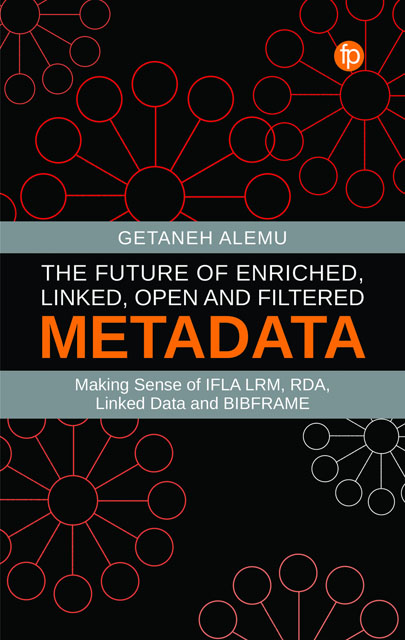 The Future of Enriched, Linked, Open and Filtered Metadata
The Future of Enriched, Linked, Open and Filtered Metadata Book contents
- Frontmatter
- Contents
- Figures
- Tables
- Code snippets
- About the Author
- Preface
- Acknowledgements
- Abbreviations
- 1 Introduction to Metadata
- 2 Metadata Strategies and Quality Indicators
- 3 Metadata Use Cases
- 4 Contemporary Metadata Principles
- 5 Enriched and Linked Metadata
- 6 Open Metadata
- 7 Filtered Metadata
- 8 FRBR, LRM and the Notion of Work
- 9 Resource Description and Access (RDA)
- 10 BIBFRAME: A New Metadata Framework
- 11 Crowdsourcing and User-Generated Metadata
- References
- Index
- Frontmatter
- Contents
- Figures
- Tables
- Code snippets
- About the Author
- Preface
- Acknowledgements
- Abbreviations
- 1 Introduction to Metadata
- 2 Metadata Strategies and Quality Indicators
- 3 Metadata Use Cases
- 4 Contemporary Metadata Principles
- 5 Enriched and Linked Metadata
- 6 Open Metadata
- 7 Filtered Metadata
- 8 FRBR, LRM and the Notion of Work
- 9 Resource Description and Access (RDA)
- 10 BIBFRAME: A New Metadata Framework
- 11 Crowdsourcing and User-Generated Metadata
- References
- Index
Summary
Metadata crosscuts almost every area of life wherethere is a need for information organisation. Itconstitutes one of the core functions of libraries,archives and museums. It helps to ensure that printand electronic resources are findable, discoverableand usable by users, hence justifying the return oninvestment. Metadata is also central to thepreservation and access of cultural heritageobjects. Unless they are systematically organisedthrough relevant metadata and indexed, it isimpossible to access and determine the relevancy ofthe multi-billion pages of information on the web(Boulton, 2014). Information discovery relies onmetadata, including search, relevancy ranking,faceted refinement and grouping related resources(Varnum, 2016). The growing volume and diversity ofdigital information resources in libraries andarchives requires accurate, relevant, structured,scalable, enriched and inter - operable metadata.Such metadata supports the description, management,retrieval, discovery and access of these resources(Alemu and Stevens, 2015; Gartner, 2016).
The book defines and discusses metadata as data thathelps find, identify, locate, filter, access, useand evaluate an information resource. Metadata is alever to search and sift through other information.By doing so, it saves time for the user. Metadata iswhat we enter in a search engine. It helps usnavigate and find our paths in an office ofinformation. Without it, we lose our sense ofdirection. Metadata is ‘about-ness’ – it helps usanswer the what, who, where and when of a specificinformation object – a book, a play, musicrecording, image or video. It is a language forfinding, re-finding and discovery. We search, find,filter, sift through, prioritise, select, access,buy or sell using metadata. It is thus a greatmarketing tool. Metadata is the naming of people,things, places and objects. On a social mediasetting, metadata consists of the likes, dislikes,tags, shares, comments, reviews and recommendations– which provide insight into the credibility,trustworthiness and integrity of information.
This book looks at how metadata supports users’information search and discovery. Users areinterested in access, and they like to do so in aninstant, 24/7, full text and at theirconvenience.
- Type
- Chapter
- Information
- The Future of Enriched, Linked, Open and Filtered MetadataMaking Sense of IFLA LRM, RDA, Linked Data andBIBFRAME, pp. xxi - xxivPublisher: FacetPrint publication year: 2022


